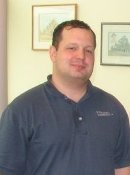Christopher Pascoe

- BS Geological Engineering 1999
- MS Geological Engineering 2001
|
Chris Pascoe earned a BS in Geological Engineering (1999), a BS in Mining Engineering (2000), and an MS in Geological Engineering (2001)—all from Michigan Tech. Pascoe began at Michigan Tech in the summer of 1994, and finished seven years later. His goals changed over time. “My original plan was to focus on the area of groundwater and hydrogeology and then changed to more of the geophysics side associated with the oil and gas industry,” he explains. “I ended up concentrating more on the mining side, but still with a focus on the geologic sciences. I then decided to get a degree in mining engineering in order to gain additional knowledge.” Pascoe was able to secure a good, practical MS project in the mining industry with partial funding from a mining company. The project involved building a 3D geological model of an iron ore deposit in Michigan and studying the distribution of gypsum in the deposit. “It provided me with a set of tangible skills that I was able to leverage to get my first job.” Now an engineering manager at Rio Tinto, Pascoe works on a mining development project called Resolution Copper, one of the largest undeveloped copper resources in the world. “The mine will be more than 7,000 feet deep, and is very technically challenging from a geotechnical perspective and also because the virgin rock temperatures at depth are more than 175 degrees F. This project will supply approximately 25 percent of the US copper supply once in production. I manage a group of mining engineers, geotechnical engineers, and consultants to work on the future design and development strategy. The engineering scope that I am responsible for is worth multiple billions of dollars in terms of infrastructure and the plant that will be constructed. From an engineering perspective, this is one of the preeminent projects in the mining world.” Pascoe believes the study of geological engineering provides a unique learning experience. “I find that decisions must be based on a valid interpretation of oftentimes uncertain, incomplete and/or conflicting pieces of information. A strong background in geosciences provides this type of practical grounding and perspective.” During the course of his career, Pascoe has enjoyed the good fortune of traveling to six continents and many different countries. “A career in the geosciences can be very international in nature, if one wants it to be.” This profile appeared in the Spring 2013 issue of On the Faultline, Volume 2, Number 5. |